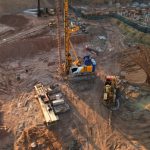 The Dos and Don’ts of Construction Site Excavation
The Dos and Don’ts of Construction Site Excavation
Construction site excavation is the process of digging and removing soil, rocks, and other materials to make way for new structures or underground utilities. This process is critical for any construction project, but it can also be hazardous if not done correctly. In this blog post, we will discuss some of the dos and don’ts of construction site excavation to ensure the safety of workers and prevent damage to the environment.
DO: Conduct a Site Assessment
Before beginning any excavation work, conduct a site assessment to identify potential hazards, such as underground utilities, pipelines, or abandoned structures. You should also assess the soil stability to determine if additional support is needed for the excavation site. A site assessment can help you plan the excavation work and ensure that proper safety measures are in place.
DO: Obtain Necessary Permits
Depending on the size and scope of the excavation work, you may need to obtain permits from local and state regulatory agencies. These permits are required to ensure that the excavation work complies with environmental regulations and standards. Failure to obtain the necessary permits can result in hefty fines or even legal action.
DO: Use Proper Safety Equipment
Construction site excavation can be dangerous, and it’s essential to use proper safety equipment to protect workers and prevent accidents. Safety equipment includes hard hats, safety glasses, high visibility vests, and sturdy work boots. Additional equipment such as safety harnesses and fall protection gear should be used for work performed above ground level.
DO: Call Before Digging
Before digging, it’s important to call local utility companies and have them mark the location of any underground utilities. Digging into an electrical, water, or gas line can cause serious injury or death and can result in expensive repairs. Call before digging to ensure that excavation work can be done safely.
DO: Backfill as Soon as Possible
Once the excavation work is complete, backfill the site as soon as possible to prevent the soil from settling or eroding. Backfilling will also reduce the risk of collapse and improve the stability of the excavation site. Use approved materials for backfilling and compact the soil to prevent air pockets.
DON’T: Neglect Environmental Factors
Environmental factors must be considered during excavation work. Ensure that excavation work does not cause erosion or sedimentation near waterways or negatively impact wildlife habitats. Pollution controls such as silt fencing and sediment basins should be used to prevent soil and sediment from entering waterways.
DON’T: Ignore Weather Conditions
Weather conditions can have a significant impact on excavation work and worker safety. Excavation work should not be performed during adverse weather conditions such as heavy rain, snow, or high winds. Additionally, soil can become unstable during dry conditions, which can increase the risk of collapse. Monitor weather conditions and adjust excavation work accordingly.
DON’T: Rush the Work
Excavation work should be performed methodically and systematically to ensure the safety of workers and prevent mistakes. Rushing the work can lead to accidents, injuries, and costly mistakes. Plan the excavation work in advance and ensure that all workers understand the plan and their roles in the process.
DON’T: Overload Dump Trucks
Overloading dump trucks can increase the risk of accidents and damage to roads and infrastructure. Ensure that dump trucks are loaded within the limits of their capacity and that the load is properly secured and balanced. Overloading dump trucks can also lead to fines and legal action.
Conclusion
Construction site excavation is a complex process that requires careful planning, attention to safety measures, and compliance with environmental regulations. By following the dos and don’ts of construction site excavation, you can ensure the safety of workers on the site and prevent costly mistakes. At Randy Roan Construction Inc., we are committed to providing high-quality excavation services that comply with safety standards and best practices. Contact us today to learn more about our excavation services.

